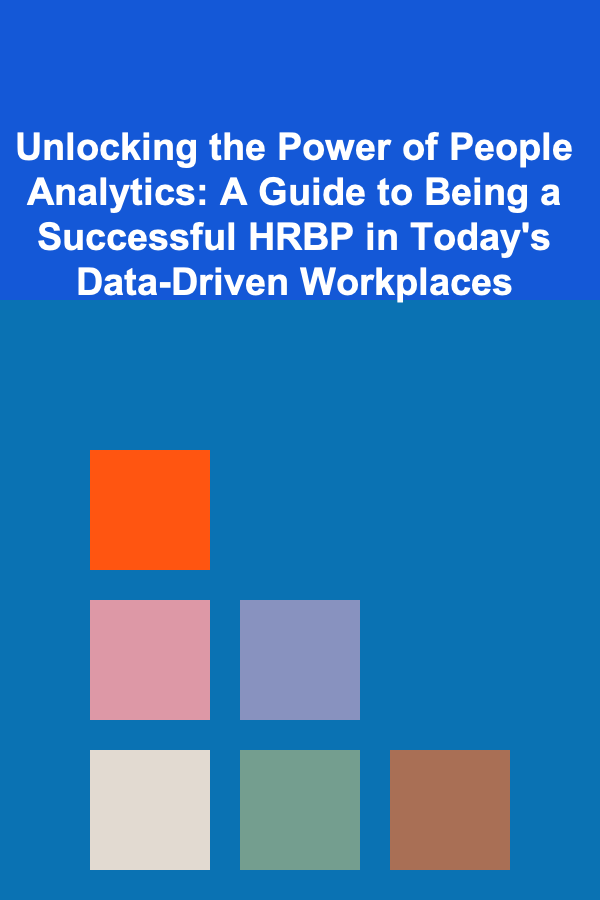Building a Business Around Digital Budget Trackers
ebook include PDF & Audio bundle (Micro Guide)
$12.99$7.99
Limited Time Offer! Order within the next:
The digital age has revolutionized how people manage their finances. One of the standout tools that have gained popularity in recent years is the digital budget tracker. These applications or platforms help individuals, families, and businesses track their income, expenses, and savings goals, providing users with the tools they need to make informed financial decisions.
If you're considering building a business around digital budget trackers, now is the perfect time. The demand for personal finance management tools is at an all-time high, driven by a growing desire for financial literacy and a shift toward digital solutions. In this actionable guide, we'll explore how to create, market, and grow a business that provides digital budget trackers.
Understand the Market and Target Audience
Before you dive into the development of a digital budget tracker, it's essential to understand the target market and its needs. A key factor in the success of your business will be your ability to meet the specific pain points of potential customers.
Key Market Segments:
- Individuals and Families: These customers are looking for tools to help them manage their personal finances, set monthly budgets, and track spending. They may struggle with overspending or find it challenging to save for big goals like vacations, education, or retirement.
- Small Businesses: Small business owners need to track cash flow, expenses, and profits in real time. A digital budget tracker can help them streamline financial processes, reduce manual work, and improve decision-making.
- Freelancers and Contractors: Freelancers often deal with irregular income streams and need tools to track both business expenses and personal finances. A specialized tracker can offer features tailored to their needs, such as tax deductions and project-based budgeting.
- Students: Many students live on tight budgets and need simple, easy-to-use tools that help them track their spending, avoid debt, and start building healthy financial habits early on.
Key Features to Consider:
- Ease of Use: The tracker should be intuitive and user-friendly. People who are not financial experts should be able to use it with ease.
- Customizability: Offer flexibility for users to customize categories based on their unique needs, whether it's for personal budgeting, business expenses, or savings goals.
- Automation: Automation features, such as automatic categorization of expenses, syncing with bank accounts, or receiving alerts about spending limits, can save users a lot of time.
- Data Security: Since budget trackers handle sensitive financial information, ensuring top-tier data security and privacy is crucial to build trust with your users.
Develop the Digital Budget Tracker
The heart of your business will be the digital budget tracker itself. Whether you plan to develop the product in-house or hire a development team, it's essential to create a tool that is both functional and user-friendly.
Key Development Considerations:
-
Platform Selection: Choose the platform or platforms where you want your budget tracker to be available. Will it be a web-based app, a mobile app, or both? Think about where your target audience spends most of their time.
- Web-based: A web app can be accessed from any device, which may appeal to users who prefer desktop solutions.
- Mobile: A mobile app will provide the flexibility to track spending on the go. It's ideal for people who want to log their expenses as they happen.
-
User Interface (UI) and User Experience (UX): Design a simple, intuitive interface that ensures an easy-to-navigate experience. Avoid overloading the user with too many features or information at once.
- Dashboard: Your dashboard should provide an overview of the user's financial situation, including income, expenses, and remaining budget for the month.
- Visualization: Charts and graphs that show spending trends, budget allocation, and savings goals can help users understand their financial habits better.
-
Integrations: One of the most valuable features you can offer is integration with other financial tools. Consider integrating with banking APIs, credit card companies, and other financial management services. Automatic syncing of transactions will greatly reduce the effort required from users to input data manually.
-
Security Features: Ensure your product complies with industry-standard security measures, such as encryption for sensitive data. Implement multi-factor authentication (MFA) and offer users control over their data privacy.
-
Testing and Feedback: Before launching, test the tracker thoroughly. Consider releasing a beta version to gather feedback from early users. Use their insights to make improvements and fix bugs before the full-scale launch.
Monetization Strategies for Your Digital Budget Tracker
Once you've developed a digital budget tracker, it's time to consider how to monetize your product. A sustainable revenue model will be key to the longevity of your business.
Monetization Options:
- Freemium Model: Offer a basic version of the tracker for free, but charge for advanced features such as premium budgeting tools, personalized financial reports, or the ability to connect multiple bank accounts. This model encourages widespread adoption while creating an avenue for paid upgrades.
- Subscription Model: Charge users a monthly or yearly subscription for access to premium features. A subscription-based model ensures a steady revenue stream and provides the flexibility to update features and offerings regularly.
- One-Time Purchase: Offer a one-time purchase option for customers who prefer not to commit to a subscription. This could be a good option for users who want a permanent solution without ongoing fees.
- Ad-Supported Model: For a free version, you could introduce ads within the app. This approach works well if you have a large user base and can generate significant ad revenue.
- Partnerships with Financial Institutions: Partner with banks, credit unions, or other financial service providers to offer the tracker as a value-added service. You could receive a commission for each customer who signs up through these partnerships.
Effective Marketing of Your Digital Budget Tracker
Even the best digital budget tracker won't be successful if no one knows about it. Marketing is crucial to gaining traction and attracting your target audience. Here's how you can market your product effectively:
Digital Marketing Strategies:
- Search Engine Optimization (SEO): Optimize your website and app store listings for relevant keywords related to personal finance, budget tracking, and money management. Create high-quality content such as blog posts, guides, and tutorials that drive organic traffic to your site.
- Social Media Marketing: Leverage social media platforms like Facebook, Instagram, Twitter, and LinkedIn to engage with your audience. Share tips, success stories, and updates about new features. Create a community where users can share their experiences and tips.
- Influencer Marketing: Partner with influencers in the finance, lifestyle, and personal development niches to promote your tracker. Influencers can help expand your reach to a wider audience.
- Referral Programs: Create a referral program that rewards users for bringing in new customers. Word-of-mouth marketing can be extremely effective, especially in the personal finance space.
- Paid Advertising: Invest in paid ads on Google, Facebook, or Instagram to target specific demographics. Ads should highlight the unique value proposition of your tracker, such as its ease of use, features, or security.
Content Marketing:
- Educational Content: Publish blog posts, eBooks, and video tutorials that teach people how to manage their finances better. The content should highlight the benefits of using a digital budget tracker and show users how to make the most of your product.
- Customer Testimonials and Reviews: Showcase real-life success stories of users who have improved their financial situation with your tracker. These testimonials can build trust and credibility for your brand.
Scale and Grow Your Business
Once your digital budget tracker has gained traction, it's time to think about scaling your business and expanding your customer base.
Scaling Strategies:
- Expand Features: Continue to enhance your product by adding new features based on user feedback. For instance, consider adding investment tracking, debt repayment planning, or integration with tax software.
- Offer Multiple Language Support: If you're targeting international customers, consider adding multi-language support to your app. This can significantly expand your user base, especially in non-English speaking regions.
- Collaborations and Partnerships: Explore partnerships with financial institutions, educational platforms, or other fintech startups. Strategic collaborations can help you access new markets and increase credibility.
- Mobile App Updates: Regularly update your mobile apps with new features, improvements, and bug fixes. Consistently providing a smooth user experience will help you retain users in the long run.
Provide Excellent Customer Support
Customer support is crucial in building a loyal user base. Providing top-notch service will make users more likely to recommend your product to others.
Key Customer Support Strategies:
- Multichannel Support: Offer multiple support channels such as email, live chat, and social media. Respond to queries and issues quickly to ensure customer satisfaction.
- Help Center: Create a detailed help center or knowledge base with FAQs, troubleshooting guides, and video tutorials to help users resolve common issues on their own.
- User Feedback: Encourage feedback and continually improve your product based on customer suggestions. Listening to users and acting on their input will help you maintain a loyal customer base.
Conclusion
Building a business around digital budget trackers offers a significant opportunity in today's fast-evolving financial landscape. By understanding your target audience, developing a user-friendly product, choosing the right monetization strategy, and effectively marketing your tool, you can create a sustainable and scalable business. Focus on continuously improving your product, listening to customer feedback, and building a strong brand, and you'll be well on your way to success in the booming personal finance industry.

Building and Selling Deep Learning Solutions for Consistent Passive Income
Read More
How to Choose the Best Index Funds for Long-Term Growth
Read More
How to Maintain Your Home's Appliances for Peak Performance
Read More
How to Plan a DIY Crafting Party at Home
Read More
Unlocking the Power of People Analytics: A Guide to Being a Successful HRBP in Today's Data-Driven Workplaces
Read More
What Should You Know About Organizing Your Car for Road Trips?
Read MoreOther Products

Building and Selling Deep Learning Solutions for Consistent Passive Income
Read More
How to Choose the Best Index Funds for Long-Term Growth
Read More
How to Maintain Your Home's Appliances for Peak Performance
Read More
How to Plan a DIY Crafting Party at Home
Read More
Unlocking the Power of People Analytics: A Guide to Being a Successful HRBP in Today's Data-Driven Workplaces
Read More